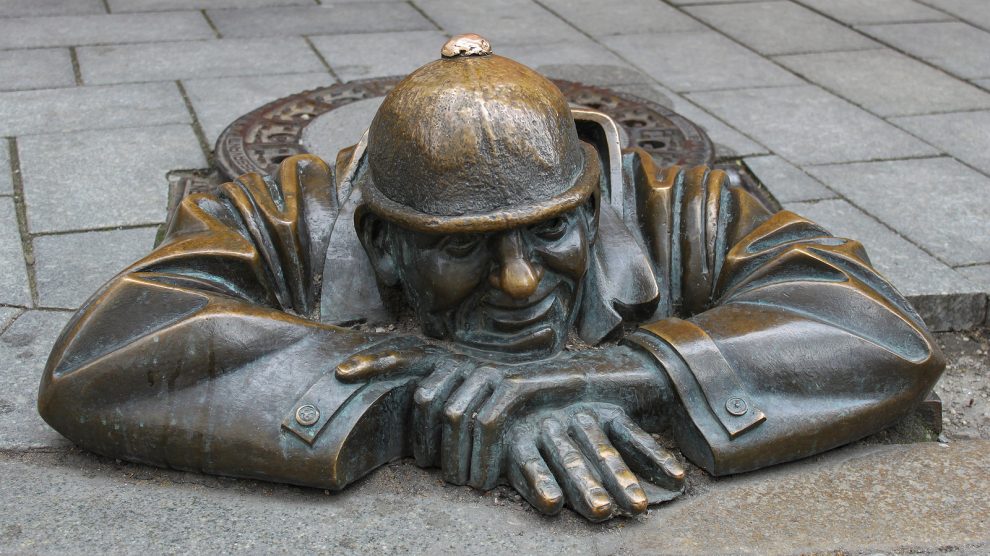The case of Slovakia highlights the broader challenges faced by Central and Eastern European countries in the midst of Russia’s aggression and manipulative narratives.
The perception of truth in Central and Eastern Europe prevails over falsehoods, but not universally, according to a new opinion poll conducted by GLOBSEC across eight countries (Bulgaria, Czechia, Hungary, Latvia, Lithuania, Poland, Romania and Slovakia).
The poll examines the susceptibility to key narratives – both true and manipulative – concerning the war in Ukraine, NATO, Western nations, the EU, democracy and public health.
- In CEE, sustainability goals have become security goals
- The last word: Emerging Europe’s impressive journey
- Countries that bolster and protect human capital will better withstand future economic shock
The impact of internal politics, historical context and cultural factors on the populations’ attitudes are evident in cases of countries with the lowest pro-West and pro-Ukraine support – Bulgaria, Hungary and Slovakia.
“While the war in Ukraine had a considerable effect on public opinion in most countries (as evidenced in the polling in 2022), this year, the polling results show a deepening of the divisions between more and less resilient countries,” says the director of GLOBSEC’s Centre for Democracy and Resilience, Dominika Hajdu.
NATO support
GLOBSEC, a think tank, which is currently holding its annual forum in the Slovak capital Bratislava, says that average support for NATO membership among the polled countries is 79 per cent, but the figures differ significantly across the countries, with 94 per cent of Poles supporting the membership on the one hand, and 58 per cent of Slovaks and Bulgarians on the other.
Similarly, an average of 74 per cent acknowledge that military support helps Ukrainians defend itself against Russia, but in Slovakia and Bulgaria, more people believe that arming Ukraine provokes Russia and brings their countries closer to war.
“Slovakia is a clear example of how agenda-setting by certain political representatives influence public opinion, especially in a society with a high susceptibility to believe disinformation,” says Katarína Klingová, a GLOBSEC senior research fellow.
“Slovakia, currently facing historically low levels of trust in institutions, with only 18 per cent having confidence in the government and 37 per cent in the president, has been marred by political chaos and turmoil caused by the ruling coalition from 2020 to 2023. This lack of trust has created fertile grounds for opposition parties to exploit the situation. They have undertaken a campaign blaming the West for the war and undermining support for Ukraine, which has resonated with a significant portion of the population.
“Capitalising on frustrations and fears, a few representatives have successfully swayed the so-called ‘gray zone’ of public opinion for the moment. As Slovakia anticipates an early parliamentary election in late September, the campaign is expected to intensify, potentially further shaping the country’s political landscape.”

Addressing distrust
The case of Slovakia also highlights the broader challenges faced by Central and Eastern European countries in the midst of Russia’s aggression and manipulative narratives.
The susceptibility to disinformation and internal politics continue to shape public opinion across the region. It underscores the need for policymakers, civil society, and the media to promote factual information, foster unity and address the underlying factors that contribute to shifting views.
Overall, the report shows that the perception of truth in the CEE region prevails over falsehoods, but not universally.
For instance, the impact of the health-related disinformation shared during the Covid-19 pandemic contributed to distrust towards pharmaceutical companies, health organisations and vaccinations. Approximately 37 per cent of the CEE region believe that Covid-19 vaccines increase the risk of premature deaths, and 56 per cent suspect pharmaceutical companies of concealing effective treatments for diseases like Covid-19 and cancer due to profit motives.
“These sentiments also resonate in societies that exhibit greater resilience against geopolitical misinformation, such as Czechia and Poland. To ensure preparedness for future health crises, the distrust should be addressed now, when health is not at the top of the political agenda,” adds Patrik Szicherle, a GLOBSEC research fellow.
Unlike many news and information platforms, Emerging Europe is free to read, and always will be. There is no paywall here. We are independent, not affiliated with nor representing any political party or business organisation. We want the very best for emerging Europe, nothing more, nothing less. Your support will help us continue to spread the word about this amazing region.
You can contribute here. Thank you.


